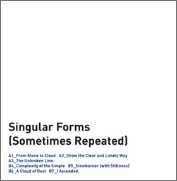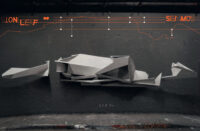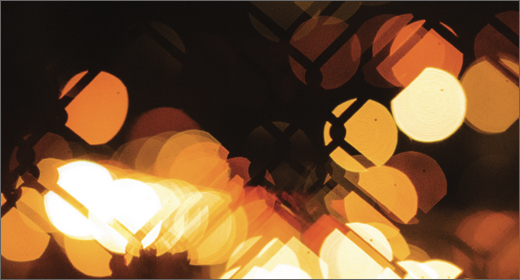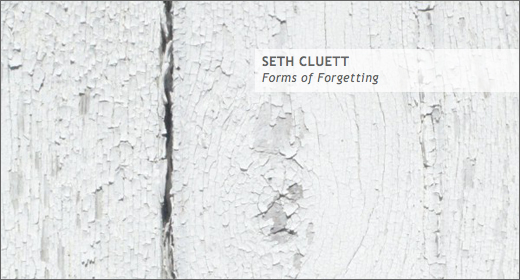
(April 2010) Aside from Type’s welcome series of re-issues and previously unreleased soundtracks, this is the first full album of new material from Sylvain Chauveau in five years, following up Down to the Bone’s tribute to Depeche Mode with a new series of compositions once again showcasing his vocal talents together with another stage in the evolution of his new, minimalist sound characterised by stripped and scrupulous instrumentation and unidentified electronic interference. Almost nothing of Chauveau’s more romantic, classical and fully orchestrated sound remains here.
It’s also fair to say that Chauveau’s vocals have evolved and matured even further since then, and there’s a greater confidence and expression in his voice than before. This may have something to do with the more personal nature of this work, after all these are his songs, not someone else’s. There’s really no point in beating around the bush, though, so I’ll just say it: he sounds almost exactly like David Sylvian, so much so that if you were listening to this blind might be forgiven for thinking that you were listening to the new David Sylvian record. The only thing that gives it away is the occasional inflection stemming from Chauveau’s accent, but otherwise he is almost a doppelganger of Sylvian; it’s quite uncanny.
His rich and entrancing voice flits and flashes through the full range of the stereo field, sometimes appearing unexpectedly or in surprising locations, often clipping into previous lines and with varying levels of distortion or decay, and often not until several minutes into a composition adding a beguiling extra dimension to the work. His lyrics at times recall the cut-up techniques employed by David Bowie, or the fragmented approach to song structure and the songwriting process that again recall David Sylvian, particularly in recent works like “Manafon” and “Blemish.”
Take the skewed lyrics of the decidedly odd “The Unbroken Line” for example, its textures sounding for all the world like Nacht Plank with only the most minimal, rusted framework of electronic whirrs and scrapes bubbling up through dark, cloudy waters. Or there’s probably the album’s most memorable and structured moment in “Complexity of the Simple” as a light glockenspiel melody interleaves with the sparse piano keys, a stark musical expression underpinned by the simplest of sine-waves. Then there’s the ruthlessly minimal, sculptured and reductive approach to pop melodies and instrumentation employed by Chauveau through carefully measured piano phrases that evoke the similar explorations into deconstructed classical composition by Ryuichi Sakamoto and Carsten Nicolai on their ‘Vrioon/Insen’ projects.
This is not meant to imply that Singular Forms (Sometimes Repeated) is in any way derivative – Chauveau has been constructing music like this for years – but there are a number of very apparent and pleasing influences. As was the case on ‘S.’, the spaces between the music, even between softly hit notes, and the frequent static glitches and thrumming interruptions and intermissions are just as significant as the music itself.
Singular Forms (Sometimes Repeated) is also full of little intrigues. It’s almost as if the original has been tampered with in some way, censored or re-edited to disguise or distort some unknown truth, leaving behind a scattered collection of clues that might just help the listener solve whatever puzzle is being posed here. Why is the message “seek you will find” embedded in the track listing on the album’s cover using only subtle changes in the colour of the type? Is it a purely self-referencing conceit, perhaps nothing more than a graphic design choice, or is this a challenge deliberately set out for the listener? And what on earth is happening during “Slowburner (with Stillness)?” The story Chauveau is telling here takes on a dark, sinister tone culminating in the line: “I never said that I would help you, that’s still the cas…” and quite without warning the entire piece suddenly and abruptly drops out to minutes of flat-lining static. What happened? Did the line get cut off? Has some sinister fate befallen the protagonist? Has some incriminating evidence been erased? If so, for what reason? It’s one of the album’s most bizarre moments, and the effect is acutely noir-ish.
Singluar Forms (Sometimes Repeated) may be a little esoteric but the questions it poses, the intricate details (so important in keeping such rigorous and minimal music fresh and interesting) embroidered into these seven pieces, and the sheer poetic beauty of Chauveau’s songwriting will keep many coming back for more.
Singluar Forms (Sometimes Repeated) is out now on Type. [Listen & Purchase]

























